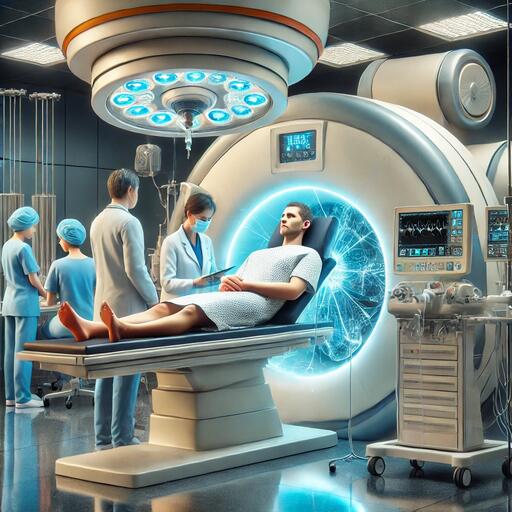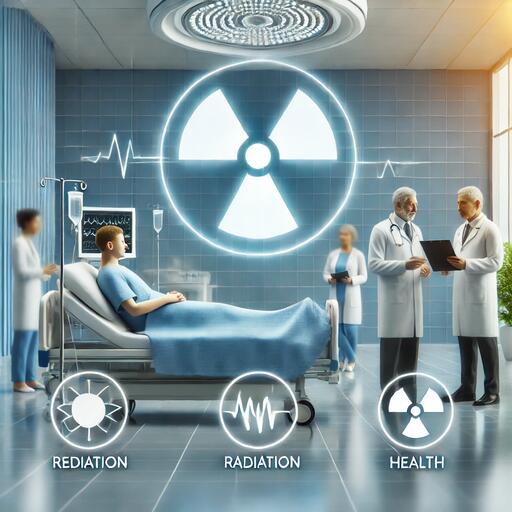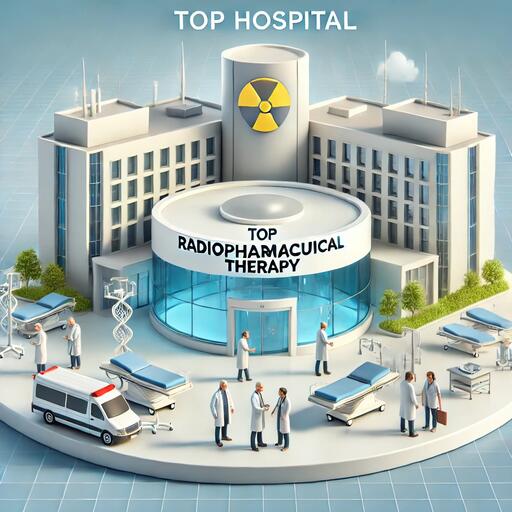Radiopharmaceuticals are a unique form of treatment that combines radiation with pharmaceutical compounds to target specific diseases, particularly cancers. By delivering radiation directly to the cancerous cells, radiopharmaceuticals minimize damage to surrounding healthy tissues. In this guide, we explore how radiopharmaceuticals work, the types of cancer they treat, and where they are available in India.
Medical disclaimer: This content is for general awareness and does not replace a doctor’s consultation. For diagnosis or treatment decisions, consult a qualified specialist.

What are Radiopharmaceuticals?
Radiopharmaceuticals are radioactive compounds used for both diagnostic and therapeutic purposes in medical imaging and cancer treatment. They work by delivering radiation directly to cancer cells through a radioactive isotope bound to a pharmaceutical agent. The radiation emitted by the isotope destroys the targeted cells without affecting healthy tissues nearby.
How Do Radiopharmaceuticals Work?
The treatment involves the use of a radioactive isotope that is tagged to a molecule designed to target cancer cells. Once the radiopharmaceutical is administered into the bloodstream, it travels to the specific area of disease. The radioactive component then emits energy, which helps in either diagnosing the condition through imaging or treating the cancer by destroying cells from within.
Types of Radiopharmaceuticals
There are two main types of radiopharmaceuticals used in medicine:
- Diagnostic Radiopharmaceuticals: These are used in imaging tests like PET scans or SPECT scans to help identify cancers or other diseases. They emit gamma radiation that can be captured by imaging devices.
- Therapeutic Radiopharmaceuticals: These are used to treat cancers and certain other conditions by delivering radiation directly to the disease site. Examples include radium-223 for bone cancer and lutetium-177 for neuroendocrine tumors.
Which Cancers Are Treated with Radiopharmaceuticals?
Radiopharmaceuticals are highly effective for treating cancers that have metastasized or those located in difficult-to-reach areas. Some cancers that can be treated include:
- Prostate cancer: Radiopharmaceuticals like radium-223 target bone metastases in advanced prostate cancer.
- Neuroendocrine tumors: Lutetium-177 is used to treat neuroendocrine tumors by delivering radiation directly to the cancer cells.
- Thyroid cancer: Iodine-131 is used to destroy thyroid cancer cells, particularly after surgery.
- Bone metastases: Radiopharmaceuticals are highly effective in treating cancers that have spread to the bones from the breast, prostate, or lung.
Eligibility for Radiopharmaceutical Therapy
Patients who are eligible for radiopharmaceutical therapy typically have advanced or metastatic cancers that are difficult to treat with conventional methods. This therapy is often recommended for patients with:
- Bone metastases from prostate cancer or breast cancer
- Neuroendocrine tumors that have not responded to other treatments
- Thyroid cancers, particularly after surgery or chemotherapy
- Cancers that are inoperable or recurrent
Benefits of Radiopharmaceuticals in Cancer Treatment
Radiopharmaceuticals offer several unique advantages over traditional cancer treatments, such as:
- Precision: Radiopharmaceuticals target cancer cells directly, minimizing damage to surrounding healthy tissue.
- Combination Therapy: They can be used alongside other treatments like chemotherapy or surgery to enhance overall effectiveness.
- Less Invasive: Unlike surgery, radiopharmaceuticals do not require invasive procedures and are administered through injection or infusion.
- Effective for Metastatic Cancers: Radiopharmaceuticals are highly effective in treating cancers that have spread to other parts of the body, such as bone metastases.

Top Hospitals Offering Radiopharmaceutical Therapy in India
Several leading hospitals in India offer radiopharmaceutical therapies for cancer patients. These include:
- Tata Memorial Hospital in Mumbai
- Apollo Cancer Centres across various cities
- Fortis Memorial Research Institute in Gurgaon
- All India Institute of Medical Sciences (AIIMS) in Delhi
Cost of Radiopharmaceutical Therapy in India
The cost of radiopharmaceutical therapy in India depends on the type of radiopharmaceutical used and the hospital. On average, the cost ranges between ₹5 lakh and ₹15 lakh, which is significantly lower than in Western countries, where the same treatment can cost much more.
Success Rates of Radiopharmaceutical Therapy
Radiopharmaceuticals have demonstrated high success rates in treating specific types of cancers, particularly in advanced cases where other treatments may have failed. Studies show that patients with bone metastases or neuroendocrine tumors experience significant symptom relief and, in some cases, a halt in cancer progression after radiopharmaceutical treatment.

Radiopharmaceuticals vs. Traditional Cancer Treatments
While traditional cancer treatments like chemotherapy and radiation therapy affect both cancerous and healthy cells, radiopharmaceuticals offer a more targeted approach. This precision allows for higher doses of radiation to be delivered directly to the cancer cells, while sparing healthy tissue, making it particularly beneficial for metastatic cancers.
Is Radiopharmaceutical Therapy Safe?
Radiopharmaceutical therapy is generally safe, but like all cancer treatments, it carries certain risks. Common side effects may include fatigue, mild pain at the injection site, or a temporary decrease in blood cell counts. However, serious side effects are rare, and the benefits often outweigh the risks, especially in cases of advanced cancer.
How to Prepare for Radiopharmaceutical Therapy in India
Before undergoing radiopharmaceutical therapy, patients will undergo a detailed evaluation, including imaging tests to determine the extent of the cancer. Doctors will also assess the patient's overall health to ensure they are fit for treatment. Depending on the type of cancer, patients may need to stop certain medications or adjust their diet before the procedure.
Frequently Asked Questions (FAQs) About Radiopharmaceuticals in India
1. What are Radiopharmaceuticals?
Radiopharmaceuticals are a group of pharmaceutical drugs containing radioactive isotopes. They are used for both diagnosis and treatment of various medical conditions, particularly in cancer treatment and imaging.
2. How are Radiopharmaceuticals used in cancer treatment?
Radiopharmaceuticals are used in targeted radionuclide therapy (TRT), where radioactive isotopes are administered to patients. These isotopes directly target cancer cells, minimizing damage to surrounding healthy tissues.
3. Which are the top hospitals in India offering Radiopharmaceutical treatments?
Some of the top hospitals in India offering radiopharmaceutical treatments include:
- Tata Memorial Hospital, Mumbai
- Apollo Hospitals, Chennai
- Fortis Memorial Research Institute, Gurgaon
- AIIMS (All India Institute of Medical Sciences), Delhi
- Kokilaben Dhirubhai Ambani Hospital, Mumbai
4. What are the common conditions treated with Radiopharmaceuticals?
Radiopharmaceuticals are commonly used to treat cancers such as prostate cancer, thyroid cancer, and bone metastases, and for imaging in heart disease and neurological conditions like Parkinson’s disease.
5. What is the cost of radiopharmaceutical treatment in India?
The cost of radiopharmaceutical treatments in India can vary significantly depending on the type of therapy and hospital. Generally, treatments range from ₹50,000 to ₹2,50,000 per session, with certain advanced therapies costing more.
6. Are radiopharmaceutical treatments covered by insurance in India?
Many health insurance providers in India cover radiopharmaceutical treatments, especially for cancer. However, it's important to confirm with your insurer regarding specific coverage for radionuclide therapy or diagnostics.
7. What are the potential side effects of radiopharmaceutical therapy?
Common side effects include nausea, fatigue, and temporary low blood counts. In some cases, patients may experience localized pain, especially in areas where the cancer has spread (such as bones).
8. How long do radiopharmaceutical treatments last?
The duration of treatment varies depending on the type of radiopharmaceutical and the condition being treated. Some treatments are administered in a single session, while others may require multiple sessions over several weeks.
9. Are radiopharmaceutical therapies safe?
Yes, radiopharmaceutical therapies are generally considered safe when administered under medical supervision. The radioactive substances used are carefully controlled to minimize exposure to healthy tissue.
10. What are the qualifications of hospitals offering radiopharmaceutical treatments in India?
Top hospitals offering radiopharmaceutical treatments are usually accredited by national and international medical boards like NABH (National Accreditation Board for Hospitals & Healthcare Providers) and JCI (Joint Commission International), ensuring high standards of care.
Discover the Best Oncologists and Cancer Hospitals in India
When it comes to cancer treatment, finding the right specialist and hospital can make a significant difference in the outcome. In this blog, we have compiled a list of the top oncologists and cancer hospitals across major cities in India, ensuring that you have access to the best care available.
Top Oncologists in Major Cities
For those seeking expert oncologists, we have identified the best specialists in key cities:
Leading Cancer Hospitals
In addition to finding the right specialist, choosing the right hospital is crucial for comprehensive cancer care. Here are the top hospitals in major cities:
Get more indepth information on Cancer treatments and their costs
Conclusion
Finding the right oncologist and hospital is the first step in your cancer treatment journey. Explore the links above to learn more about the top specialists and hospitals in your area.